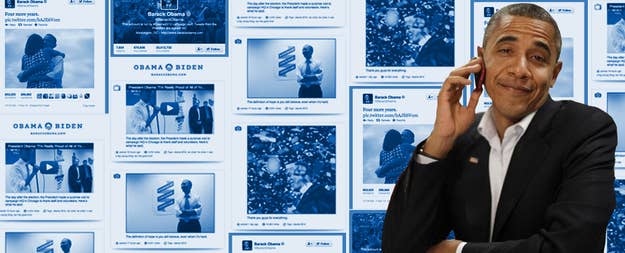
WASHINGTON, DC — Don't believe the cheesy good-bye e-mails from aides and the super-triple-final requests for donations: The Obama campaign and its giant e-mail list are here to stay.
The pace may have slowed, but the campaign is still tweeting, still e-mailing, still posting to Tumblr and Facebook. And on a conference call with reporters Thursday, campaign manager Jim Messina hinted at a much larger role.
"We're going to go through a process with our supporters and have a conversation about what they want to do next," he said, on what his deputy, Stephanie Cutter, billed as the "last conference call for the OFA campaign."
The future of this massive online organization, and of the enormous data operation that backs and interacts with it, is perhaps the most important and most-asked organizational question left by the 2012 elections. The conference call offered several clues on what shape the organization will take, but one thing is clear: This digital empire is likely to be important both to President Barack Obama's last term and to whatever follows it.
"It could be his Clinton Global Initiative, targeted at home," suggested one Democrat close to the campaign.
And Obama's lieutenants have suggested that they will keep a tight hold on the most powerful techncial tool in American politics.
"You just can't transfer this, right," David Plouffe told reporters, ruling out handing it over to the Democratic National Committee or a 2016 candidate. "I mean, people are not going to spend hours away from their families and their jobs, contributing financially when it's hard for them to do it, unless they believe in the candidate."
In the nearer term, it appears aides are hoping the organization provides the president with assistance as he prepares to tackle the "fiscal cliff" — the massive spending and tax decisions that need to be made in the coming weeks and months.
They may also reverse what many see as an error in 2008: keeping "Organizing for America," as the successor to that first campaign was known, on the sidelines. After their historic victory, Obama aides recognized that they had amassed a heap of political capital in the form of millions of e-mail addresses and cell phone numbers of marginal or swing voters, as well as an army of loyal volunteers and staffers. At one point in 2009, the group mobilized hundreds of thousands of calls to Congress to pass health care reform, inundating the switchboard.
But the White House quickly sidelined the organization at the request of congressional leaders, who resented the president's early attempts to apply pressure on them inside their own districts. And Obama campaign aides also privately acknowledged that supporters weren't as engaged as they would have liked in the group "because of the Jesus effect": the belief that Obama's election would magically solve all problems.
"It's not that people didn't want to work for him, or for his legislative agenda — it's that they were tired," said one aide.
That was the challenge facing the Obama campaign over the last 18 months, and it occupied a vast portion of its resources. Hundreds of field staff in states by the end of the campaign helped, but the statistic masked the efforts of the dozens who hadn't left since 2008 and had been organizing supporters for the president nonstop since April 2011.
But even so, it all came down to the connection between the president and his supporters.
"We have remarkable staff, and the campaign that Jim put together, you know, is the best in history, but the reason those people got involved was because they believed in Barack Obama," Plouffe said, offering the key for any future iteration of OFA. "It was a relationship between them and our candidate."
The Obama campaign now has a second chance to turn its digital prowess toward governance, and they're unlikely to defer to anyone this time.
